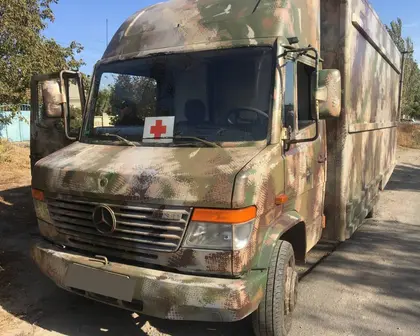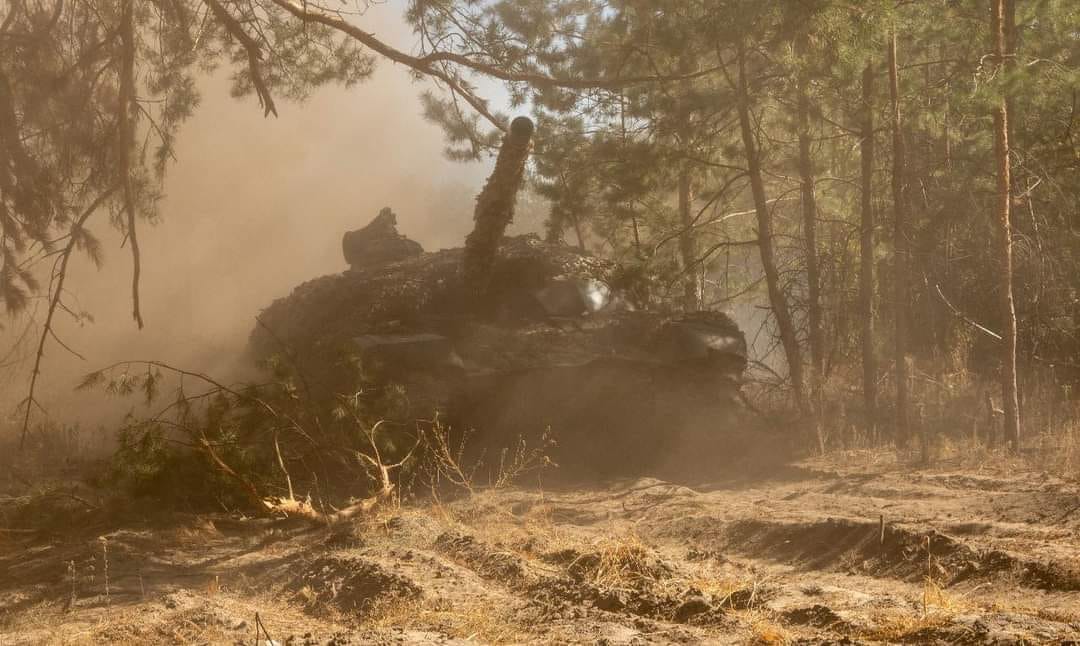A mobile dentistry unit now offers Ukrainian soldiers and civilians dental help in regions close to the front line, completely abandoned by medical assistance. Larisa Kobal and Andriy Kolisnichenko, founders of the charity Forpost Ukraine, told Kyiv Post about their project and experience in the field.
Our team has been working since April 2023. It took six months to create the vehicle, raise funds, and install the equipment. The basis of the transport is a postal transport vehicle. Currently, in Ukraine, there are about a dozen mobile dental teams, with 12 doctors working in shifts. They operate every day, and doctors work 2 days a week. Our dental brigade basically has no weekends. The doctors in our brigade all work on their day off from their main job.
Many surgeons but lack of dentists
There are many medical missions that work with both military and civilians. So the question of general medicine is more or less resolved. Today, you can find a surgeon, but with dentistry, it’s a disaster!
In some towns before the war, there were at least two dental offices, but with the first explosions, they packed and left. This means that, for two years, there has been no dentist in that town. Take Inhulets (Belozersky district, Kherson region) for example: the bridge is blown up, you have to use a pontoon, you can’t drive along the Dnipro’s shore because it’s shelled, so you have to go through plantations, dirt roads. And you have to reach Kherson to get to any dentist. There are only a few clinics working there now. Some people who came to Kherson for treatment were told to wait at least two weeks because the list of appointments is huge.

South Ukraine City Cut Off From Electricity
Why dental assistance is important for combat purposes
It’s necessary for the soldier to be healthy and combat-ready. Accordingly, any toothache is a problem for combat readiness. Whether a soldier has a tooth or not is not important. The main thing is that the soldier can perform the combat task.
For example, snipers are deliberately not killed but wounded. Killing is easier: there was an enemy, and now there is no enemy. But with the wounded, there are many more problems: they need to be evacuated, treated, a vehicle needs to be sent to bring him to the hospital. If a person is injured, a lot of people are immediately distracted from combat actions. That’s why we treat, remove, open abscesses every time, because people don’t seek treatment until the last moment, thinking it will pass on its own. We clean the root canals, anything and everything.
How to choose between assisting soldiers or civilians
Of course, we don’t refuse civilians. Wherever we stop, military personnel bring civilians to us. How can we refuse? We accept and treat them. We are currently considering getting a second vehicle, so that one works only with the military, and the other with civilians.
How the mobile dental unit works
Let’s take Inhulets as an example again. It’s 4 km to the Dnipro. A shift change is needed after more than 5 days because doctors simply cannot physically work longer. On average, we have about 35 to 36 people per shift. This means there were 17 people one day and 18 people the next day. The working hours are from 9 a.m. to 8 p.m., but in reality, it goes until 11:30 p.m. because all instruments need to be sterilized, materials repackaged, documented, and so on, just to prepare for the next morning. Working for four consecutive days in this mode, believe me, on the fifth day, you can’t work anymore. That’s why shifts need to be changed.
There are only two people in the vehicle, two doctors. Sometimes there can be two experienced doctors and one who plays the role of an assistant. We don’t take students, only interns. Experience has shown that we don’t need a separate assistant or nurse.
For example, I am at work, I’ve seen five or six people. Then I go to have lunch. Either the head of the village or the military brings us food. They don’t even ask; they just bring it. So, while I am eating, the person who should be working takes over. If it’s the second doctor, the work doesn’t stop. But if it’s a nurse, then no one works. And we came there to work. That’s why interns, as young doctors who can clean teeth or put in a filling, can be with us.
The problem of safety of doctors and patients
The Kherson region is shelled everywhere. It’s generally unsafe. There have been instances, where we call to announce that we’re coming on a brigade call, but we get stopped because they are shelling with KAB [KAB-500 is a Russian precision-guided weapon] and are asked not to proceed. In such cases, we call another brigade and go to them.
But for us, we always need camouflage nets, hidden spots, always searching for some trees. Once, we were 6 km from the Russians. That’s very close. They placed us near a three-story building and said we should stay there. But there was not a single tree around. Where do we stay? There’s a kindergarten; we can use it for accommodation. And what about the building opposite, which is bombed? That’s a school. So, the school has already been bombed, and the kindergarten is next in line. Of course, we won't stay in such places, and we won't spend the night in such a location. We found an abandoned house with a beautiful tree. We hid the car under it, slept in sleeping bags, and it's much safer because buildings higher than one floor are a greater risk.
Russian forces suspect that if there’s a kindergarten, theoretically, it’s a potential residence for military personnel. Of course, geolocation is consistently disabled for us, and we make sure that all doctors have it turned off. It has become a habit to look up when getting out of the car, searching for drones in the sky before going from the house to the car.
As one general told us, by law, we should be 25 km away from the front line. But no one will bother to gather patients in a car and bring them to us 25 km away. That’s why we go to them.
Dental services offered
The dental brigade does everything except prosthetics.
All our equipment is duplicated – so if something breaks, work won’t stop. We are a fully self-sufficient closed-loop system. We have everything of our own: generator, water, autoclave. Once we had to work for two days on our generator because nearby villages were bombed, and there was no electricity. From the arrival of the vehicle at the location, we can start accepting patients within 30 minutes.
We’ve had individual experiences with implants. It’s not systematic, but if we had the opportunity to use a 3D printer, we would be all for it. But then an intraoral scanner should be automatic for these purposes. Still, it would be better to have a second vehicle for these purposes. Of course, prosthetics are needed. There are cases when soldiers have nothing to chew with, and there are quite a few of them among the military. Partly, it could be our fault because we may have already extracted several teeth for them. So, having a scanner and printer for prosthetics is an easy way to solve the problem. We’ve already tried to do it through laboratories. But try to imagine the situation: you made a crown for a soldier, agreed to install it, came, and the soldier is no longer there. This is war.
What soldiers say
When a soldier sits in our chair, music plays, monitors light up, they usually say: “Guys, thank you. Besides fixing my teeth, it feels like I’ve experienced normal life.” For them, it’s a 30-minute reboot. It’s a small piece of peacetime for them.
How to choose which location to visit
Usually, a brigade sends us a request and we go where our help is needed. However, recently we received a request from the Luhansk region, and after calculating, we realized that the costs of the round-trip would be half of everything. We once were asked to go to Kupyansk, and the journey itself took two days one way, which is extremely exhausting for all participants. In this case, it just doesn't make sense.
People already know about us. We receive requests from the military, and often civilians are also accommodated if necessary. We make a call, figure out the route. We discuss accommodation, meals, how many of us. Usually, two or three doctors and a separate driver. We go to the combat zone or very close to it, so we need a driver-mechanic. Technical problems often arise, requiring knowledge and skills that doctors don’t possess. For example, changing a tire with a fragment in it. Sometimes something gets stuck in the car, or the dental equipment doesn’t turn on for some reason. That’s why it can’t just be any driver.
It's challenging. However, we have plans to create at least one more vehicle and dedicate it to the needs of civilians. There are doctors willing to work with civilians, since the risk is slightly lower.
The main problems
The first is the water quality, especially in the Kherson sector after the big flood. In other words, you can only drink bottled water, mineral water that washes away calcium. This is not very helpful. The second is sanitary conditions, which are deplorable for both military and civilians. In villages, the situation is even sadder. They are shelled. And no small medical or business ventures would dare to come there. So, one can simply drown in dental problems there.
Post-war plans
De-occupied territories are so heavily damaged that it will keep us busy for another 7 to 10 years, even busier than now. If the shooting stops, people will start to return, meaning an infinite amount of work. This will affect everything, including medicine, not only dentistry.
You can also highlight the text and press Ctrl + Enter










